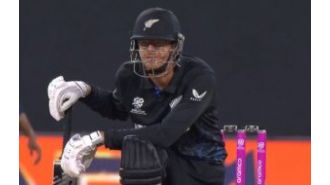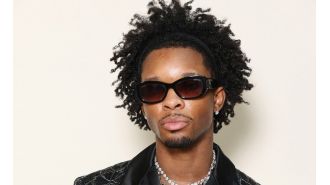Nigeria's election has been disputed, but Tinubu has been declared President-Elect.
INEC reported that Tinubu won by a large margin, receiving 8.79 million votes compared to Atiku Abubakar's 6.98 million.

IMAGETAGGOESHERE Nigeria's ruling party candidate, Bola Tinubu, was declared the president-elect of Africa's most populous nation in the early hours of Wednesday after a controversial weekend election. Tinubu, a former governor of Lagos state, will assume the position of a country facing Islamist insurgencies in the northeast, armed attacks, killings and kidnappings, clashes between livestock herders and farmers, shortages in cash, fuel and power, and chronic corruption that opponents say Buhari's party has failed to correct, despite their pledges. The Independent National Electoral Commission declared Tinubu had earned 8.79 million votes, which was more than main opposition challenger Atiku Abubakar's 6.98 million votes, and Peter Obi, a third-party candidate known to younger voters, has 6.1 million votes. Nigerian electoral law states a candidate can win if they get more votes than their opponents, and if they have a minimum of 25% of the votes from two-thirds of the 36 states and the federal capital of Abuja, which Tinubu accomplished.
Opposition parties disregarded the results, claiming the process was defective due to the introduction of new technology by INEC, and on Tuesday they asked chairman Mahmood Yakubu to step down. Tinubu asked voters to elect him based on his track record during his two terms as Lagos state governor at the turn of the century, during which he decreased violent crime, improved the city's traffic jams and cleaned up rubbish. The 70-year-old has, however, appeared weak in public, speaking with a slur and answering questions with platitudes, and skipping several campaign events, leading some to question how successful he will be. Obi's campaign attracted young people and urban, more educated voters who were fed up with the corrupt politics of the past, the two parties that have represented it since the end of military rule in 1999, and the older men who have usually run them.
IMAGETAGGOESHERE Nigeria's ruling party candidate, Bola Tinubu, was proclaimed the president-elect of Africa's most populous nation in the early hours of Wednesday after a weekend election which the primary opposition parties had disputed. Tinubu, a previous governor of Lagos state, will take on the leadership of a country confronting Islamist insurgencies in the northeast, armed attacks, killings and kidnappings, disagreement between livestock herders and farmers, money, fuel and power deficiencies, and persistent corruption which opponents say Buhari's party has failed to eradicate, despite assurances of doing so. The Independent National Electoral Commission claimed Tinubu secured 8.79 million votes, surpassing main opposition contender Atiku Abubakar's 6.98 million votes. Peter Obi, an outsider popular with younger voters, attained 6.1 million votes. Nigerian electoral law says a candidate can win by getting more votes than their competitors, provided they get 25% of the vote in at least two-thirds of the 36 states and the federal capital Abuja, which Tinubu did. Opposition parties rejected the results as the product of a flawed process, which experienced multiple technical issues due to the implementation of new technology by INEC, and on Tuesday requested its chairman, Mahmood Yakubu, to step down. Tinubu asked voters to elect him on his track record during his two terms as Lagos state governor at the turn of the century, during which he lessened violent crime, improved the city's traffic jams and cleared up rubbish. The 70-year-old has, however, sometimes seemed feeble in public, slurring his speech and responding to questions with platitudes, and skipping several campaign events, causing some to doubt how effective he would be. Obi's campaign drew in young people and urban, more educated voters exasperated with the corrupt politics of the past, the two parties that have represented it since the end of military rule in 1999 and elderly men who have tended to dominate them.
Opposition parties disregarded the results, claiming the process was defective due to the introduction of new technology by INEC, and on Tuesday they asked chairman Mahmood Yakubu to step down. Tinubu asked voters to elect him based on his track record during his two terms as Lagos state governor at the turn of the century, during which he decreased violent crime, improved the city's traffic jams and cleaned up rubbish. The 70-year-old has, however, appeared weak in public, speaking with a slur and answering questions with platitudes, and skipping several campaign events, leading some to question how successful he will be. Obi's campaign attracted young people and urban, more educated voters who were fed up with the corrupt politics of the past, the two parties that have represented it since the end of military rule in 1999, and the older men who have usually run them.
IMAGETAGGOESHERE Nigeria's ruling party candidate, Bola Tinubu, was proclaimed the president-elect of Africa's most populous nation in the early hours of Wednesday after a weekend election which the primary opposition parties had disputed. Tinubu, a previous governor of Lagos state, will take on the leadership of a country confronting Islamist insurgencies in the northeast, armed attacks, killings and kidnappings, disagreement between livestock herders and farmers, money, fuel and power deficiencies, and persistent corruption which opponents say Buhari's party has failed to eradicate, despite assurances of doing so. The Independent National Electoral Commission claimed Tinubu secured 8.79 million votes, surpassing main opposition contender Atiku Abubakar's 6.98 million votes. Peter Obi, an outsider popular with younger voters, attained 6.1 million votes. Nigerian electoral law says a candidate can win by getting more votes than their competitors, provided they get 25% of the vote in at least two-thirds of the 36 states and the federal capital Abuja, which Tinubu did. Opposition parties rejected the results as the product of a flawed process, which experienced multiple technical issues due to the implementation of new technology by INEC, and on Tuesday requested its chairman, Mahmood Yakubu, to step down. Tinubu asked voters to elect him on his track record during his two terms as Lagos state governor at the turn of the century, during which he lessened violent crime, improved the city's traffic jams and cleared up rubbish. The 70-year-old has, however, sometimes seemed feeble in public, slurring his speech and responding to questions with platitudes, and skipping several campaign events, causing some to doubt how effective he would be. Obi's campaign drew in young people and urban, more educated voters exasperated with the corrupt politics of the past, the two parties that have represented it since the end of military rule in 1999 and elderly men who have tended to dominate them.










